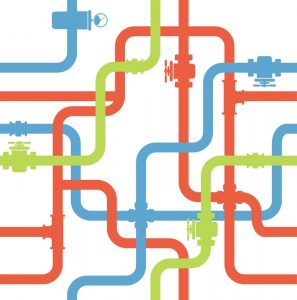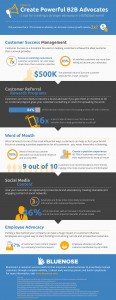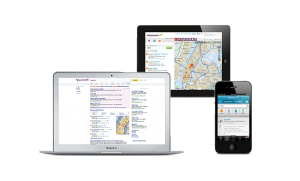As China emerges from the first major wave of the COVID-19 pandemic, its economy is setting an example for the rest of the world. But, industries are hesitant to resume the status quo amid continuing economic fears. Therefore, Chinese officials must do more than remove economic restrictions. They must give confidence to the battered companies wading back into uncertain markets. There needs to be a way to save the supply chain from COVID-19.
A Complex Environment
Experts suggest that, if the Chinese economy continues to lag, it could send shock waves through global supply chains at a time when they’re already in crisis mode. Materials shortages and bottlenecks could even prolong the pandemic. It would make it more difficult for manufacturers to fulfill orders for personal protective equipment and other medical supplies.
Trust serves as the missing link between the supply side and demand side. Purchasers want what Chinese manufacturers have to offer. And, those manufacturers are similarly eager to ramp up production. When multimillion-dollar deals are negotiated in hours, it raises red flags on both sides. Failure to find common ground could inhibit the response to the pandemic and delay economic recovery. Fortunately, there’s one emerging technology uniquely suited to the needs of this moment: blockchain.
Technology Based on Trust
To everyone’s great frustration, the course of COVID-19 and its enduring economic impacts look unpredictable as ever. As companies rush to aid the COVID-19 response or fight to keep their doors open, they require trust in suppliers and partners and transparency into supply chains and contractual obligations. Luckily, blockchain excels on both fronts.
With blockchain, users gain visibility throughout the supply chain and can start monitoring for factors such as quality control, performance benchmarks, and worker standards. In the midst of the COVID-19 crisis, knowing precisely what’s happening at crucial parts of the supply chain helps prevent a bad situation from worsening.
That’s particularly true for those on the front lines of the pandemic who are trying to ensure the availability of sensitive products. Blockchain creates a permanent audit trail along every link in the chain, and buyers can use it to verify things such as the provenance of parts used in medical equipment or ingredients added to critical pharmaceuticals.
A Potential Solution For All
Even for companies operating far outside the scope of the pandemic response, blockchain has something valuable to offer at this moment. Thanks to improved transparency, buyers can seek out ethical sources that minimize their environmental footprint or abide by fair labor practices.
As consumers make tough choices on how to spend their limited disposable income, they will naturally gravitate toward companies that do the right thing — ones that act ethically. Being able to satisfy that demand could help savvy merchants make it through this crisis.
Use Cases For Blockchain
None of these applications are hypothetical, either. There are already countless instances of organizations using blockchain to counter the effects of COVID-19. For example, many Chinese charities already suffered from a credibility problem before news circulated of a Hubei medical charity’s volunteers misappropriating supplies.
To keep donation money from drying up, a startup called Hyperchain built a blockchain-based donation platform. Because it ensured full transparency in how donations are used, it secured 500 donations in just a few days after its launch. When trust was lacking, blockchain made all the difference.
In another example, a China-based mutual aid platform used blockchain to speed up claims payouts at the height of the outbreak. This could be helpful in the U.S., where unemployment offices already face an onslaught of claims. It’s easy to imagine the sweeping administrative burden created by this pandemic in offices across the country.
Being able to expedite outcomes — especially at a time when people urgently need assistance and answers — could help the pandemic response keep up with the pace of the illness itself.
Elsewhere, blockchain is doing everything from quelling the purchase of counterfeit face masks to preserving the standards of Chinese pork producers. People don’t yet associate this technology with disaster recovery, but it’s one of the best assets available for that process.
Using Blockchain in Your Own Recovery
Some might ask whether now is really the time to begin experimenting with an emerging technology like blockchain. Arguably, now is the best possible time. After all, when an unprecedented disaster strikes, it often requires a nontraditional solution.
Let’s put it less optimistically: Without blockchain, companies spanning many different industries might find it hard to recover quickly, completely, or even at all. Now is the time to implement any potential solution that could insulate your business from harm.
Use these strategies to effectively add blockchain to your own recovery effort:
1. Join an existing consortium.
A consortium that manages supplier identities and reputations using blockchain makes it relatively easy to introduce an immutable audit trail to many aspects of operations. To join one, you’ll need to identify a consortium that supports your procurement needs and integrates your suppliers. It should also support the regulations and certifications relevant to your industry and allow the supplier data from the consortium to integrate with your present system of record.
One consortium we partner with, Trust Your Supplier, has already attracted several major manufacturers. This suggests companies are starting to see blockchain as a viable and necessary tool.
2. Pursue ethical sourcing.
Remember that blockchain is merely a means to an end — and that end is improving supply chain performance. As you debate where and how to make improvements, prioritize purchasing from ethical sources. Improving communication and developing deep relationships with suppliers helps to minimize disruptions throughout the supply chain.
Besides this, companies that make ethical sourcing a priority reap a variety of benefits: They improve cost structures, build stronger relationships with suppliers, and minimize risk. For those still searching for a way to apply blockchain, sourcing ethically makes sense during (and long after) the pandemic.
3. Create a trust protocol.
Blockchain builds trust through accountability. Because every action is recorded and the records can’t be changed, any misdeed will be exposed. Meanwhile, responsible, truthful participants have a way to prove their virtue and establish trust with new partners.
In any form, blockchain applications must include a trust protocol, or a process for building trust among participants. One study demonstrated that when retailers have a high level of trust in their manufacturers, sales increase by 78%. That’s because blockchain helps companies overcome their mistrust.
Instead of wondering what’s going on behind the scenes at a partner company, blockchain creates a mutually beneficial relationship. Both sides strive to improve transparency, efficiency, and effectiveness.
A Solution at the Ready
When the world needs solutions, blockchain paves the way, including offering a way to save the supply chain from COVID-19. Irrationality and protectionism don’t have to rule the day. Blockchain keeps things open, honest, and above board for all involved.
Business & Finance Articles on Business 2 Community
(58)
Report Post




